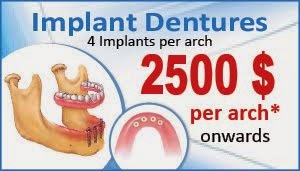A dental implant is an artificial tooth root replacement that is used in prosthetic dentistry to hold a replacement tooth or bridge. There are several types of dental implants such as the Osseo-integrated implant (where titanium is incorporated into bone), the implant-supported bridge, and the implant-supported denture.
Dental implants are used by people who have generally good oral health but have lost a tooth to periodontal disease, an injury, etc. One mayor difference between dental implants and other tooth replacement methods is that a dental implant does not rely on other teeth to support the replacement. Implants have proven to be reliable and a time tested success. In fact studies are showing that with proper maintenance a tooth implant can last a lifetime.
Listed below are a few of the reasons why people are choosing to have a dental implant.
o Looks - with today's technology periodontists are able to perform dental implants that look and feel like your real teeth. In fact, in addition to their aesthetic appeal, dental implants can protect the rest of your teeth from damage because an implant can prevent bone loss and gum recession. Unlike bridgework and dentures, a dental implant keeps all of your teeth, real or otherwise, looking great.
o Adjacent teeth - because an implant does not rely on neighboring teeth for support, teeth surrounding an implant are less likely to be altered. Long-term, this means that your remaining teeth are left un-touched by the trauma caused to a neighboring tooth.
o Comfort and confidence - Not only will you look better when you have a dental implant, but you will be able to live better as well. Dental implants allow you to eat what, when and where you want without having to worry about what your dentures can handle. It is hard to eat confidently when your dentures don't feel secure. With a dental implant, you won't have to worry about uncomfortable eating situations or the hassle of adhering your dentures with messy pastes and glues.
o Success rate - Dental implants have proven to be reliable and predictable in their performance. To date there are few opponents to the benefit that dental implants can provide for patients.
Dental implants are not necessarily right for everyone. In order to be a good candidate for a dental implant you must have good oral health and healthy gum tissues that are free from periodontal disease. This is important because adequate bone is needed in the jaw for the implant, those who suffer from bone loss in the jaw or another kind of bone-deteriorating condition may not be able to have a dental implant.
Another important consideration is the expertise of the individual performing the dental implant. Proper schooling is required to be able to give a patient a dental impact and thus far a 5 year success rate of implants has shown the success rate to be between 75-95 percent. This success rate did not include those who experienced complications due to the use of tobacco products.
It can be quite expensive to have a dental implant. In the United States a single tooth implant is about $4,000. If you were needing to do the entire arch of your mouth (all the top or bottom teeth) You can expect to spend between $12,000 and $50, 000 depending on the difficulty and complexity of the procedure.
Article Source: http://EzineArticles.com/528830










0 comments:
Post a Comment